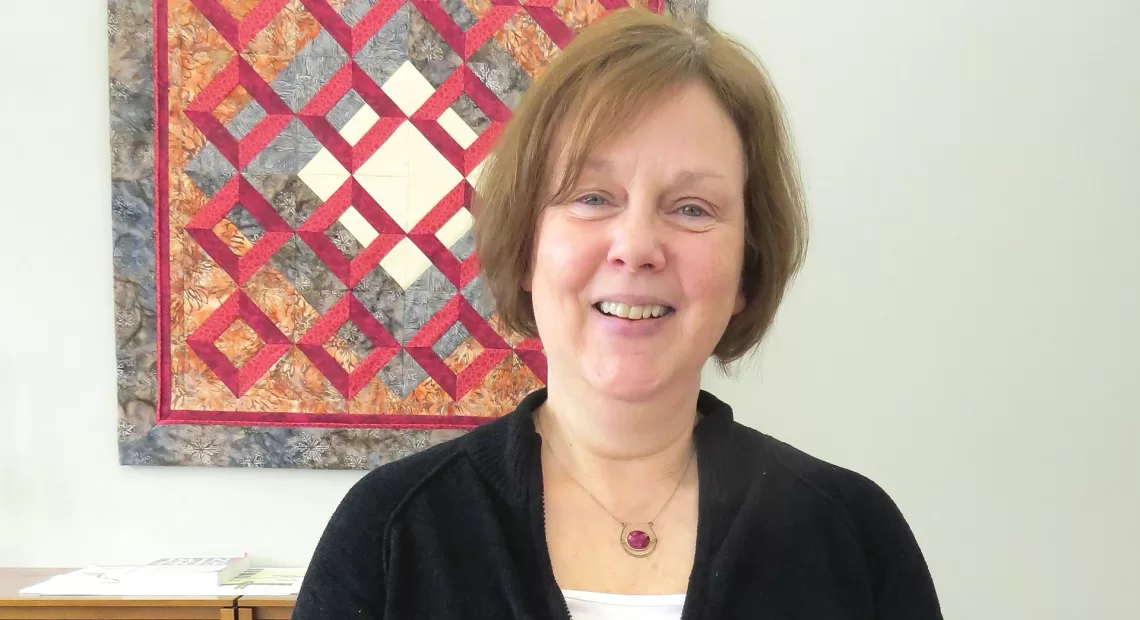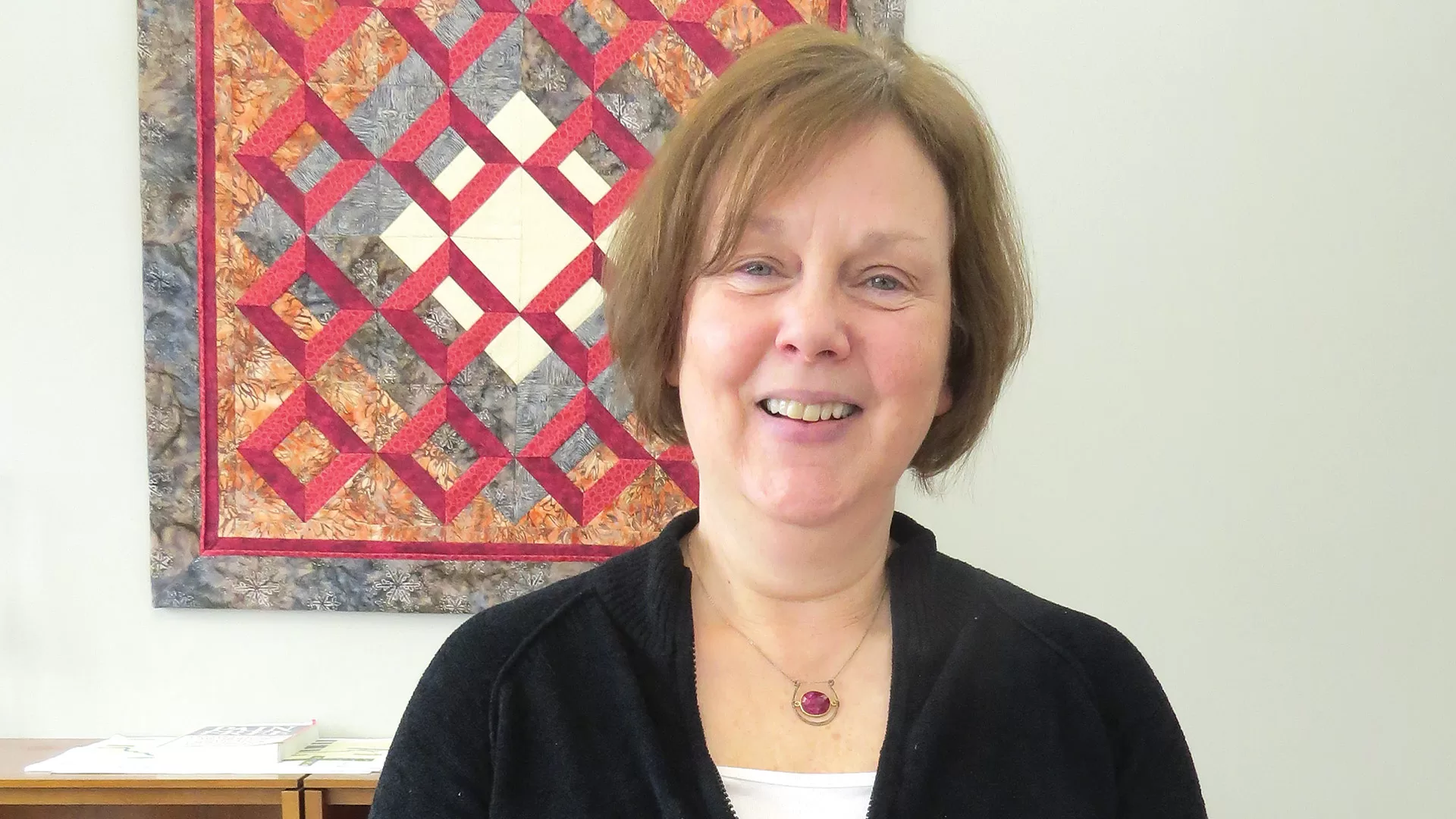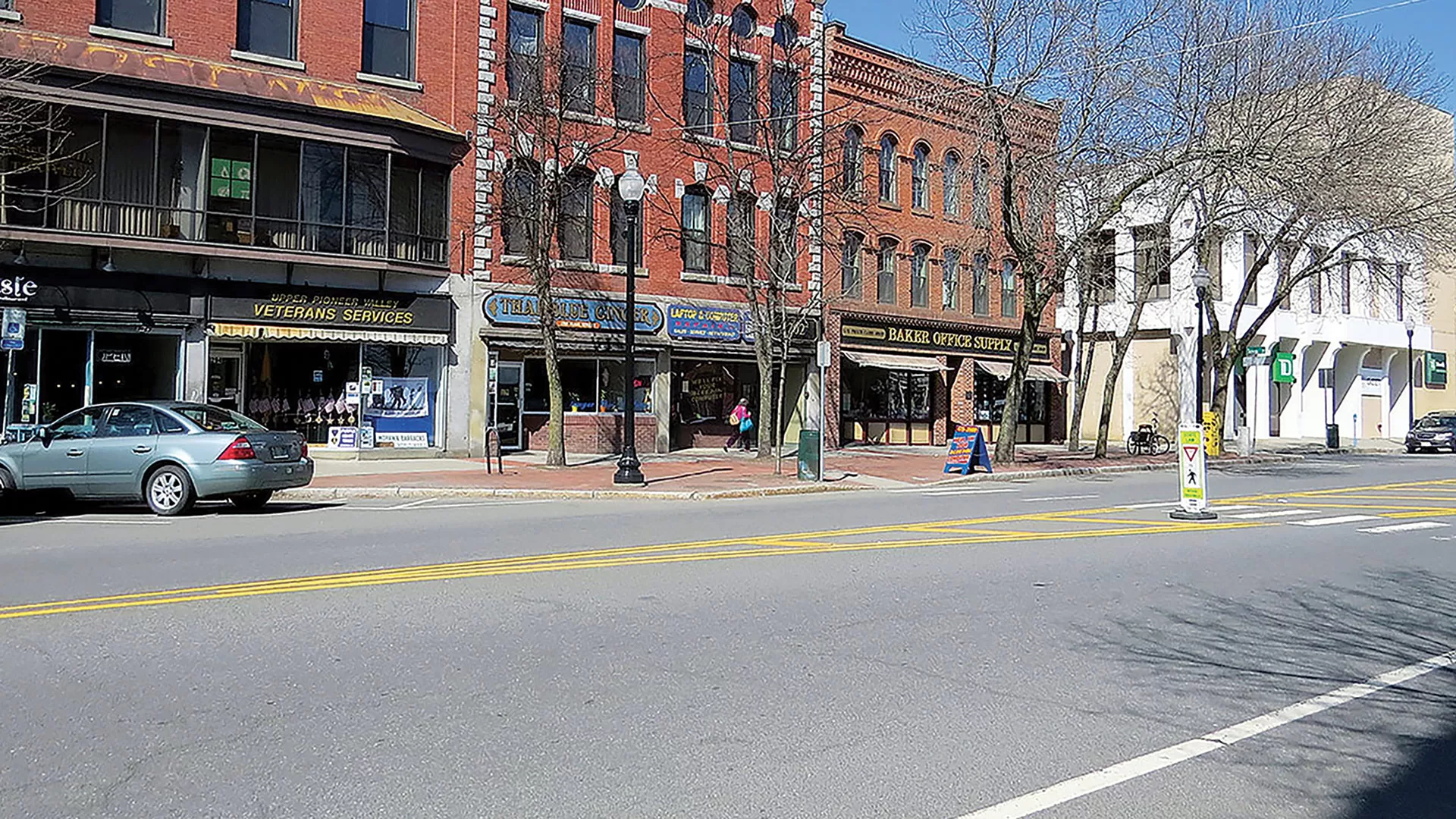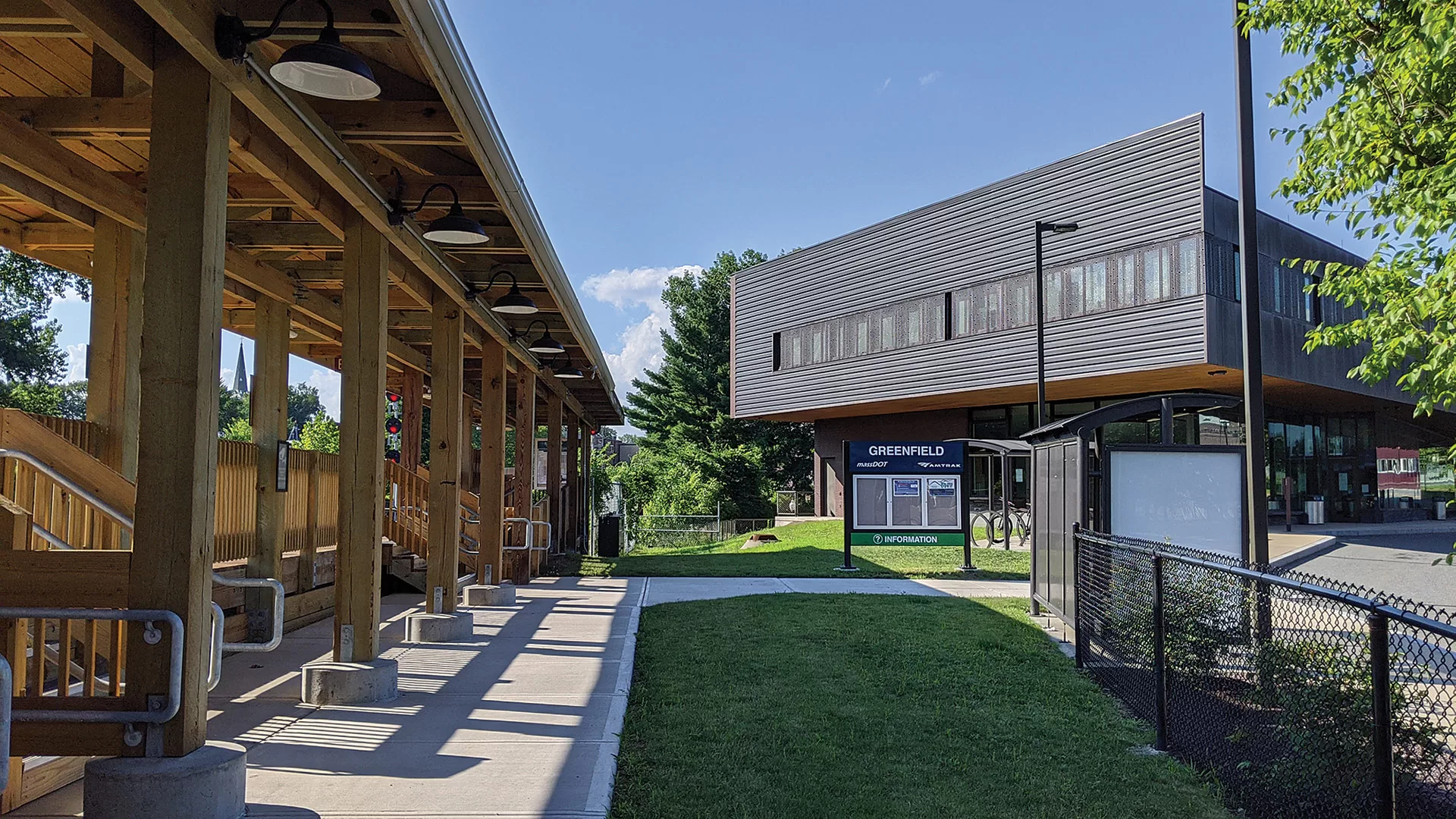
Linda Dunlavy
Executive Director, Franklin Regional Council of Governments
In Small Towns, She Makes a Big Difference

When asked what she likes about her work — and she must like it because she’s been doing it for more than 30 years now — Linda Dunlavy paused for a moment before giving an answer that was as succinct as it was powerful.
“If you’re patient … you can create positive change,” she said, putting additional emphasis on that word patient. And for good reason. When you’re dealing in complex issues such as transportation, broadband access, a housing shortage, climate change, and poulation loss, the solutions don’t come quickly or easily, she said.
To get her point across, Dunlavy, executive director of the Franklin Regional Council of Governments (FRCOG, or simply the COG, as it’s called), recalled the countless meetings she would attend with Tim Brennan, the former director of the Pioneer Valley Planning Commission who passed away in 2020 (and a Difference Makers honoree himself in 2011), as they led efforts to bring north-south rail service back to Greenfield and other communities in Western Mass.
It was a long, hard fight, she recalled, shaking her head as the reflected on the heavy amounts of early skeptism, miles put on the odometer traveling to and from more meetings than she could possibly count, and endless discussions with policymakers and power brokers in an effort to turn back the clock on rail service.
“There were people saying, ‘you’ll never get this,’ and ‘you can never justify this,’” she recalled, flashing back almost a quarter-century and the start of her work on this issue.
“Tim and I would drive to Boston all the time, and I would drive to Springfield all the time; I was meeting with MassDOT, meeting with legislators, meeting with Amtrak, meeting with the Federal Highway Administration, meeting again with MasssDOT, meeting again with legislators. And it was a lot of ‘let’s try this’ … and we’d hit a dead end and then back up, and then we’d say, ‘let’s try this option’ and hit a dead end. That was a lot of the strategic work I did with Tim: ‘what can we try next? What’s the next obstacle that needs to be overcome to prove that this is a good idea?’”
Overall, it took 15 years to get north-south passenger rail returned, Dunlavy noted, adding that passenger volumes post-COVID, high enough to convince the state to take the service from trial status to permanent in nature, validate all that hard work.
This is just one example of how her patience, and a number of other qualities, have yielded that positive change she spoke of. Others include her work to bring reliable broadband to rural communities, a project to realign Route 2 around the Erving Industries paper mill, and even the building the COG is now housed in — the John Olver Transit Center in Greenfield.
“Linda has a preternatural ability to see what needs to be done and, with transparency underpinned by a willingness to accept risk and accountability for choices, forge ahead.”
Dunlavy’s tenacity and ability to get things done were summed up effectively by Jay Dipucchio, president of Turners Falls-based Nutri-Systems Corp. and also a member of the COG advisory board, who nominated her for the Difference Makers award.
“Linda has a preternatural ability to see what needs to be done and, with transparency underpinned by a willingness to accept risk and accountability for choices, forge ahead,” he wrote. “It helps as well that the energies applied and chances taken are informed by hard-earned experience and a great depth of knowledge.

During her lengthy career with the FRCOG, Linda Dunlavy has brought services to, and been a tireless advocate for, communities in Franklin County, including Greenfield, seen here.
“She is an incomprably vigorous advocate and collaboration builder for Greater Franklin County and the Pioneer Valley,” he went on. “By cultivating collaboration and fostering innovative public-sector responses to regional service issues, her leadership of the FRCOG has created arguably one of the most unique and recognized public-service organizations in the Commonwealth, truly making a difference for the people who live here.”
In keeping with that assessment of her talents and value to the region, Dunlavy said she is focused not on what she’s been able to accomplish for the people of Franklin County — and all the state’s 170 rural communities, for that matter — but on the work still to be done.
And there is plenty of it, in realms ranging from housing to climate issues and readiness for disasters like the mirobursts and heavy rains of last July, to what has become the most crucial issue facing this region: population loss.
Dunlavy is addressing these issues and others with the requisite patience, but also large amounts of tenacity and that ability to get things done — attributes that speak to her impact as a Difference Maker.
Staying on Track
As she wrapped up her conversation with BusinessWest, Dunlavy gestured out one of the windows of her corner office to the incoming Amtrak train, the Vermonter, stopping at the depot just a few hundred feet away. She took the opportunity to count the number of people getting off and on, something she does often, and for obvious reasons.
“She is an incomprably vigorous advocate and collaboration builder for Greater Franklin County and the Pioneer Valley.”
While only a few were getting on this particular train, heading north on a Tuesday afternoon, the numbers for the trains heading south — to Northampton, Springfield, Hartford, then New York and eventually Washington — have been solid, as has overall volume for the service, she said, adding that the numbers help validate all those meetings and all that time spent convincing officials to bring the trains back to the region.
And while the return of train service may be the crowning achievement of Dunlavy’s career, there have been many others, as noted earlier.

Bringing rail service back to Greenfield and other Western Mass. communities is one of many long-term projects in Linda Dunlavy’s record of service to the region.
Beyond the larger projects, there is the day-to-day work of advocating for, and providing services to, the towns of Franklin County, but also all the rural communities of the Bay State — those with fewer than 500 people per square mile.
That’s every community in Franklin County other than Greenfield, she said, adding that these towns are small — or, in the cases of Monroe and Rowe, with populations of 120 and 394, respectively, very small.
Serving these communities is the mission of the COG, created in the wake of the abolition of county government in 1997. Today, it operates 12 programs and boasts more than 50 staff members and an annual budget of more than $5 million, funded in part by assessments to the 26 municipalities in Franklin County, but mostly through state and federal grants.
Dunlavy started with the county commission in 1993 and transitioned to the COG when it was created in 1998, and took at the helm of the organization in 1999.
Summing up its mission, she said it is similar in many ways to the Springfield-based Pioneer Valley Planning Commission. It serves the communities of Franklin County, the most rural county in the state, providing planning services as well as regionalized municipal services to those communities, as well as some outside the county. Those services include building, wiring, and inspection services, as well as the purchasing of municipal products and services for 59 towns, items such as guardrail, asphalt, salt, sand, and fuel.
“Our focus is Franklin County, but we go outside Franklin County with projects and partnerships to serve the county better,” she explained. “So we work with cooperatively with the Pioneer Planning Commission on many projects, such as rail.
“Our towns are very rural, and that’s why we provide so many municipal services,” she went on. “A small town like Buckland would have a hard time finding a qualified accountant, a qualified health agent, a qualified business inspector. So, by combining those services together, we can hire professional staff and provide those services to our rural communities.”
The State of Things
Beyond providing these services, the COG, like Dunlavy herself, serves as an advocate for the region, on issues ranging from rail to broadband to housing.
The week she spoke with BusinessWest, she was also in Boston testifiying at an 11-hour hearing on the housing bond bill and advocating for housing solutions that recognize the difficulties and contraints of developing housing in rural areas.
She was testifying in her role as part of the Massachusetts Assoc. of Regional Planning Agencies, but also as chair of the Rural Policy Advisory Commission, she said, adding that, in both capacities, she advocated for recognition that housing development in rural areas comes at a smaller scale than in Hampden County or Eastern Mass., for example, meaning there are fewer economies of scale and far fewer developers interested in building in such areas. Also, most of these rural communities have limited water and sewer infrasructure, so the cost to develop housing is much higher.
With a better understanding of these issues, she said, legislators can craft a bond bill that creates greater equity when it comes to a housing shortage that impacts virtually every community in the Commonwealth.
Meanwhile, she and others at the COG are also working to make the region more prepared for disruptions like COVID and climate-related disasters such as the torrential rains and accompanying flooding last summer, which ruined crops and damaged infrastructure.
“We need to focus on what we can learn from the devastation of the July storms, on how we make our region more resilient, and how we can get our communities to work together to set climate-resiliency priorities and choose projects togther,” she said. “If you look at all of that as emergency response … that’s a big part of what we’re doing right now.”
But the biggest challenge, though, is population loss, and it’s an issue that now commands a large amount of Dunlavy’s time and energy.
“It’s a huge issue for us; we always have it in the back of our minds in all of the work that we do — what can we do to stem population loss and attract young families to our region. Because an aging and declining population is not great for our economy.”
Elaborating, she said population growth has been stagnant since 2000, but there are projections, contained in a report prepared by the UMass Donahue Institute, for a precipitious decline, perhaps 20%, in the years to come.
That model does not take into account a resolution to the broadband issue in many Franklin County communties, she went on, nor does it factor in the rising popularity in remote work and the boost it has provided for many rural areas. So, while the projections are stark, there is reason for optimism.
“There are a lot of factors we can use to make sure those population projections don’t come true,” she told BusinessWest. “That’s a big focus of our work.”
Progress Report
As she offered a quick tour of the transit center, Dunlavy recalled the time a gentleman visited not long after it opened.
“He said, ‘I’d like something like this; how long did this take?’” she recalled, adding that the answer — more than 20 years — startled him somewhat.
That’s about the average for most of the major projects she has undertaken, she went on, stressing, again, that none of her landmark projects — be it broadband, rail, or the Route 2 realignment — came quickly or easily. Such projects require patience, and a whole lot more.
Dunlavy has those attributes, just as her friend, colleague, and mentor Tim Brennan did. And now she shares something else in common with him.
She’s a Difference Maker.




